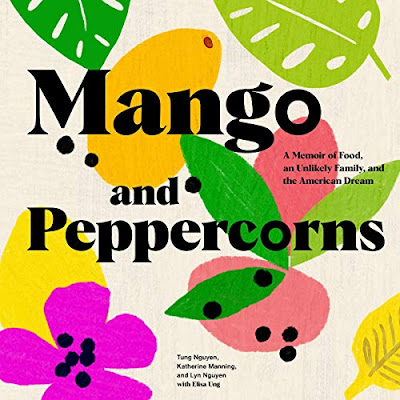
This is another book that was devoured, cooked from, but never posted last year - Mango and Peppercorns: A Memoir of Food, an Unlikely Family,
and the American Dream by Tung Nguyen, Katherine Manning, Lyn Ngyuen, and
Michelle Bernstein. Amazon certainly knows how to suggest what I like. Seriously. Food. Immigrants. Food. I'm all in.
On the Page
Not being from Miami - in fact, never having visited Miami - I was completely unaware of the legendary restaurant that is Hy Vong. This is the story of Tung and Kathy - their friendship, partnership, and family - and the American immigrant experience. It is also a tale of the ripples of war as Tung came to American with all of the emotional scars of the Vietnam War. This memoir is told in alternating perspectives from Tung, Kathy, and Tung's daughter, Lyn.
One of my best friends from high school was adopted from Vietnam and, after she returned and found her birth mother, I remember her telling me the story of bringing her here for a visit. Kathy's telling of Tung's terror of getting on an escalator was exactly same one that I was told by my friend. Little things that we take for granted are completely foreign and can be terrifying to new immigrants.
"Then we got to the escalator. Tung looked at the moving metal stairs. Then she looked at her feet. She picked up one foot, put it down, then picked up the other. She didn’t know where to place them. It was as if she was marching in place. I grabbed ahold of her thin arm and pulled her onto the bottom stair. Tung clung tightly to me. Her legs quaked so much I feared they might buckle any minute and send her toppling down the escalator. She surprised me by standing steady as we rose to the second floor."
Here's a passage from Tung that explains some of that foreignness from her perspective. We take for granted that food is cooked inside, right? "What I really wanted to do was cook. I didn’t understand America, but I understood how to make food. Maybe I could gather some sticks and build a fire outdoors. That was the only way I had ever cooked. Instead, Kathy guided me into a room in the house that she called a kitchen."
And her experience at a supermarket: "When I went inside, I couldn’t believe how clean it was. I sniffed and sniffed, but could not smell any of the fish or meat like at the markets in Vietnam. And here you could get everything you needed, indoors at one place. I gazed at all the fruits, vegetables, metal cans, and brightly colored boxes. I saw all the customers pushing around big, shiny metal carts with wheels. I grabbed one and did the same. I picked out meat, watercress, green onions, onions, lettuce, and tomatoes—what I needed to make bò lúc lc, sautéed beef and salad. Paying for the groceries was easy, and soon I was back home in the kitchen."
This sums up the book beautifully: "People who simply eat the food of refugees and immigrants, but don’t get to know them as people, miss a golden opportunity. Refugees are here because they have no choice. They also bring enormous gifts and talents, as Tung did. They just need an opportunity."
On the Plate
Interspersed in the narrative are some of Tung's recipes. I will be making her pho soon. In fact, I have a pot simmering with beef knuckles and chicken feet on the the stove as I write this. Stay tuned! But I was inspired by the "slowly braised pork
spareribs that she had cleaved into small, bite-off-the-bone pieces, in her
signature stock with fish sauce and a hefty pinch of bird’s-eye chiles." I could just imagine that marriage of salty and spicy. Since that recipes wasn't one that was included in the book, I set out to make my own version.
Ingredients
1½ to 2 pounds lean spareribs, cut into roughly 1½ inch long pieces3 cups cold water3 Tablespoons raw, local honey2 Tablespoons fish sauce2 Tablespoons soy sauce½ teaspoon sea salt2 Tablespoon toasted sesame oil1/2 teaspoon crushed bird's eye chile (also called tepin chiles)1 Tablespoon olive oilblack sesame seeds for serving, optional
Procedure
I had the butcher slice the ribs to 1-1/2" lengths. Then I sliced between the bones to create small riblets.
Pour water, fish sauce, honey, salt, sesame oil, soy sauce, and crushed bird's eye chile in a medium bowl and whisk to combine. Heat a large saucepan (I used my braiser) or wok and add olive oil.
Add spare ribs and brown on all sides over medium heat, approximately 7 to 8 minutes. Pour in the water-honey mixture and bring to a boil. There should be enough liquid to cover the spareribs. Cook over medium high heat until liquid is greatly reduced and sauce becomes thick and caramelizes. This process should take about 30 minutes.
This was after 10 minutes...
This was after 20 minutes...
You will need to be vigilant after about 25 minutes as the sauce is really caramelized and can easily scorch. As soon as the sauce is thick - like molasses - turn off the heat.
Turn the spareribs to fully coat each piece with the caramelized honey sauce. Remove to a serving platter. Garnish with black sesame seeds, if using.












I was wondering where all your Foodie Reads were during December. I just thought perhaps you were too busy to read.....Silly me.
ReplyDeleteI was looking at entries for the drawing and was like, "Where's Cam?" LOL
DeleteThis comment has been removed by a blog administrator.
ReplyDelete